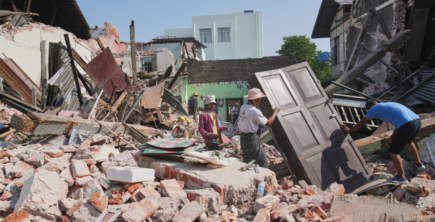
Healthy Individuals & Communities
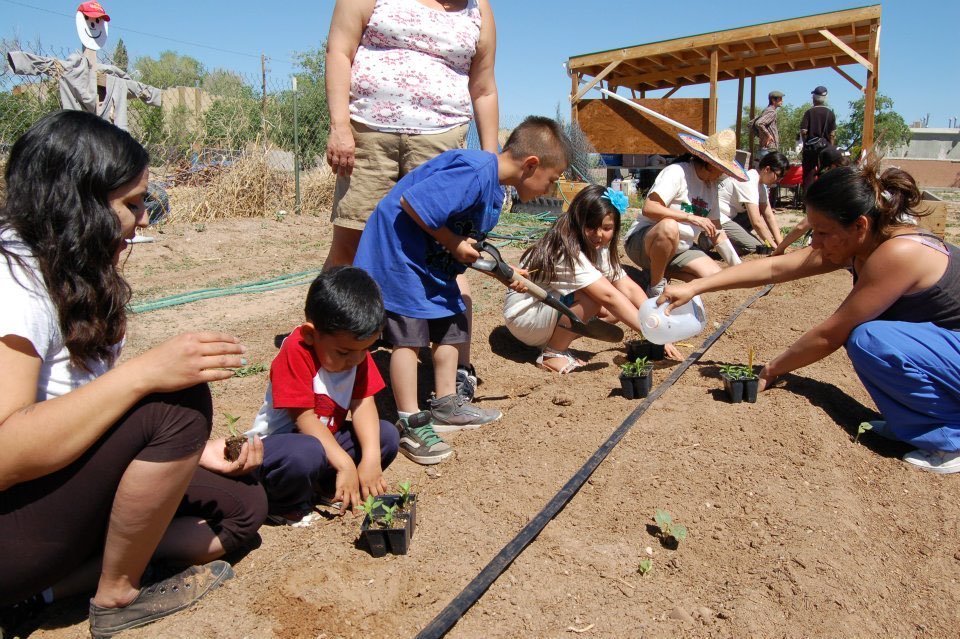
For nearly a decade, the SouthWest Organizing Project (SWOP) has been involved in the fight against the proposed Santolina real estate development in the southwest mesa of Albuquerque, New Mexico. If fully realized, the mega-development would span more than 10,000 acres and draw millions of gallons of water from an area that already struggles with water scarcity. Due to the region’s history of drought, for nearly three centuries, farmers in the region have organized to collect and share water through a system of runoff trenches, called acequias, that carry water from the mountains to the fields. The proposed real estate development could easily destabilize a delicate balancing system that has already been threatened by climate change and droughts that have lasted for years.

Children working in the International District Community Garden, which is home to Feed the Hood, SWOP’s food justice and community gardening initiative.
While SWOP has partnered with other local organizations, including the New Mexico Environmental Law Center, to stave off the Santolina development thus far, the proposed development is funded by Barclays Bank.
“Oftentimes when we have to take these legal routes, they don’t work out in our way, because the other side is very full of money and good lawyers,” said Juan Reynosa, deputy director of SWOP. “It’s hard to afford the necessary tactics, but we also understand that our role is continuing to build power within the community and educate them about these issues that impact them. Our struggle doesn’t disappear because one lawsuit didn’t get granted.”
Tides Foundation’s newly established Frontline Justice Fund (FJF) supports grassroots environmental organizations like SWOP that are fighting for climate justice through litigation. Whether the fight is against the U.S. government, a deep-pocketed corporation, or a bank like Barclays, organizations like SWOP are usually in a classic David versus Goliath situation. The FJF aims to right the balance and center the voices of community-led organizations that are fighting for basic rights — clean air, clean water, and other environmental protections — to combat environmental racism inflicted on BIPOC communities. The FJF launched in 2022 with $2.5 million in seed funding for three years and plans to scale to at least $5 million in grantmaking in the coming five years.
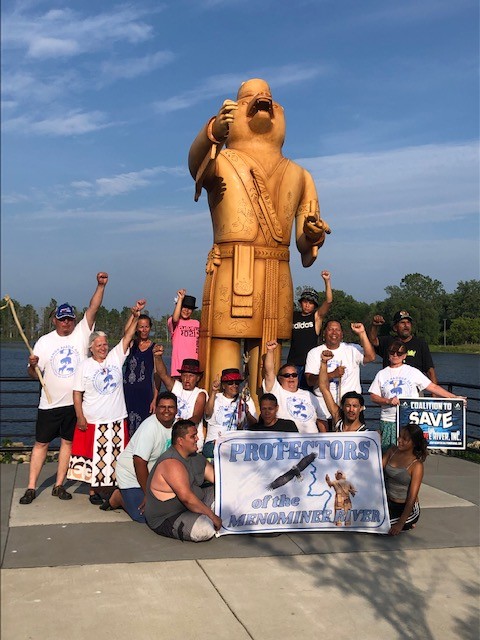
Members of the Coalition to SAVE the Menominee River Inc. standing in front of a tall bear statue, which signifies the origination place of the Menominee Indian Tribe.
Angela Mahecha, a member of the fund’s Independent Advisory Council (IAC), sees the fund as “an opportunity to get behind the battles of our lifetime, for generations.” Mahecha, who, as program director of the Environmental Justice Movement Fellowship at the New School’s Tishman Environment and Design Center, is intimately involved with grassroots organizing, says that “community groups focus on the use of litigation as a tool — winning the battles that we can and changing the rules at the same time, while building community and giving people hope. A lot of communities are fighting with very little resources when it comes to litigation.”
In Wisconsin, the battle to keep the Back Forty Mine from being built off the shores of the Menominee River has had some legal successes, but the community groups resisting it are overwhelmed by the financial impact of litigation costs. To overcome this barrier, many have applied to the FJF for support.
“This past year we have spent probably close to $60,000 on lawyer fees. All of the documents that you have to review to prepare for a case, they come so fast, so furious, and every one of those pages has to be read by an attorney,” says Dale Burie, founder of the Coalition to SAVE the Menominee River, a group of regional organizations fighting against the proposed sulfide mine. In 2021, Aquila Resources, the company that proposed the mine, was denied a wetlands permit to move forward with the project — an impressive but ultimately small victory. “Yeah, we won the case, but it was extremely expensive, and they [the corporation] are going to have to apply for five permits. Each permit application is hundreds, if not thousands, of pages to review by somebody,” added Burie.
Not only does the Menominee River supply drinking water to towns in Wisconsin and Michigan, states for which it forms a natural border, but it also runs along sacred sites belonging to the Menominee Indian Tribe of Wisconsin. The Menominee Indian tribal story holds that the tribe’s five clans were created at the mouth of the river thousands of years ago. Douglas Cox, who serves as an IAC member, is also a member of the Menominee Tribe and director of the tribe’s Land Management program. Cox alerted FJF organizers to the coalition’s uphill battle, noting, “environmental justice issues are vast, but they narrow down to impoverished arenas. Consultation, permitting, free and informed consent is needed when an industry comes into tribal lands. Zinc, copper, silver, gold mining is big in our region, between Wisconsin and Michigan,” he says. “Even with help from a national nonprofit environmental law organization, we had to use our own resources to fight this battle, paying for technical experts, groundwater monitors, etc. It puts an enormous strain on tribes to have to pay for all these things.”
After the Menominee Tribe’s 2021 legal victories dealt Aquila Resources debilitatingly expensive legal blows, Aquila was financially buoyed by its acquisition by the Gold Resource Corporation, a metal production company. Against such odds, the fund aims to provide these frontline organizations with the support to engage in these protracted environmental legal battles as they fight for the rights of their people and nature.
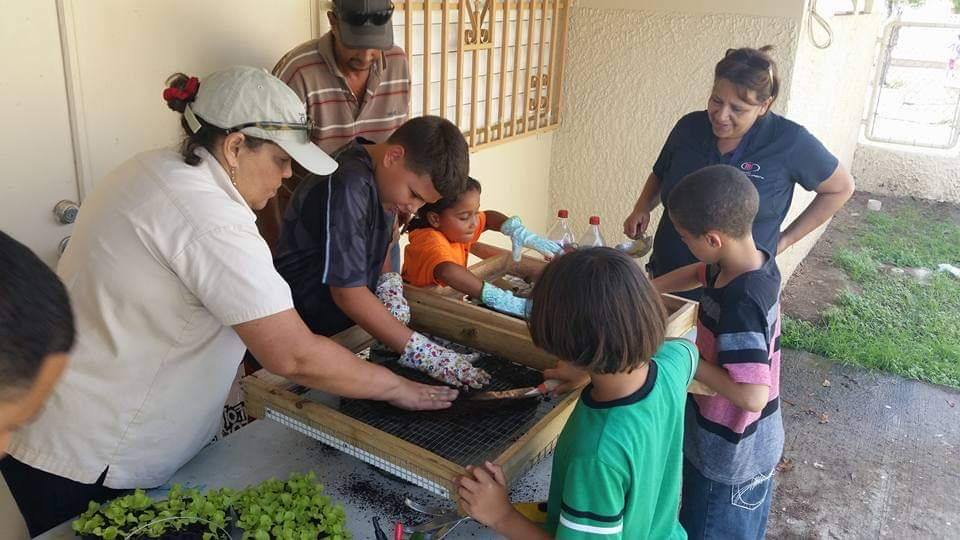
Children working in a community garden in Puerto Rico with volunteers from the Comité Diálogo Ambiental.
The FJF’s initial round of funding focused on BIPOC-led organizations comprised of community members. Comité Diálogo Ambiental in Puerto Rico is one such environmental association, made up primarily of volunteers from Salinas and Guayama, towns on the southern part of the island. The association was born in 1997 when the two communities banded together to fight against the development of a landfill site that was proposed over the South Coast aquifer, which would have been the largest landfill in Puerto Rico. Attorney Ruth Santiago, a Salinas community member with longtime family roots in the area, joined Comité Diálogo Ambiental at its incipience and was part of the legal team that successfully represented the group in the case. Comité Diálogo Ambiental’s fight to protect the aquifer and the Jobos Bay watershed, however, is an ongoing effort.
Santiago says the Aguirre Power Complex and the AES coal-fired power plants in Puerto Rico are considered the two largest sources of toxic emissions in Puerto Rico. They threaten the health of nearby communities and Jobos Bay’s dynamic ecosystem, which includes coral reefs, seagrasses, mangroves, and accompanying waterlife. Santiago works as a team with the University of Puerto Rico Law Clinic, and the Inter-American University Law Clinic in San Juan, Puerto Rico. On behalf of nine public interest groups, in 2021, they filed an administrative complaint regarding the landfill against AES, prompting the Environmental Protection Agency to demand an answer from the Fortune 500 global energy company.
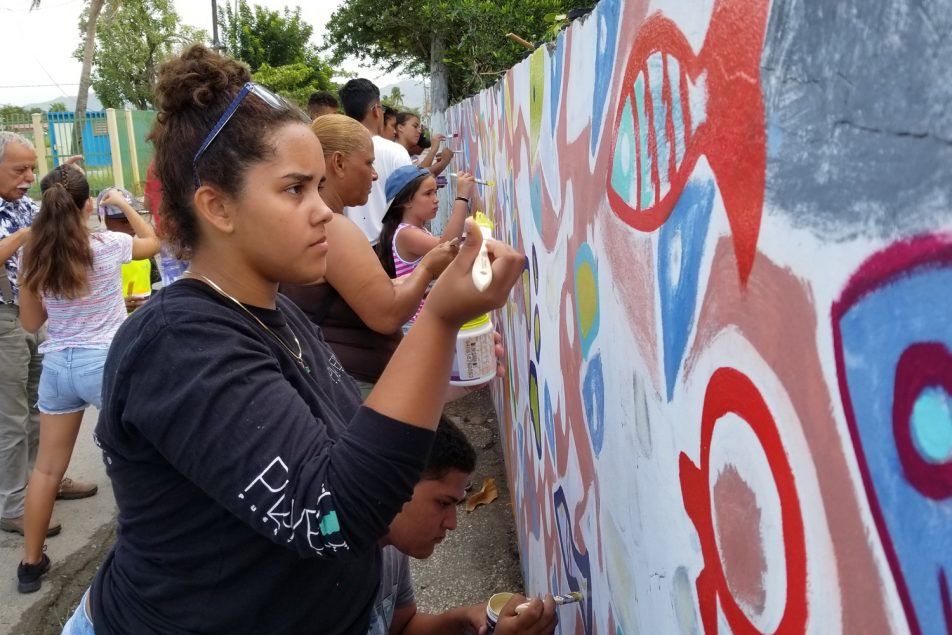
Young people painting a mural in the Las Mareas de Salinas community during the 2019 Environmental Convention.
Comité is also focused on systemic change, a priority of the FJF. The organization has partnered with other local groups in Puerto Rico in a multi-sector proposal called Queremos Sol (“We want sun”) to transform Puerto Rico’s energy system, and move it away from its dependence on fossil fuels, with the goal of achieving a renewable portfolio standard — a regulatory mandate to increase production of energy from renewable sources to 50 percent by 2035 and 100 percent by 2050.
“Here in Puerto Rico, we have a very centralized, fossil fuel–dependent electric system. Ninety-seven percent of the energy generated comes from burning fossil fuels on this sun-drenched archipelago,” says Santiago. She says that Queremos Sol’s proposals are based mostly on on-site rooftop solar energy and storage, and energy efficiency: “All alternatives to centralized fossil-fired generation and work toward energy democracy.”
After a successful first round focused on organizational leaders, the second round of the FJF’s grantmaking will continue to advance equitable environmental protections and safeguards on behalf of local communities. Climate and environmental justice litigation is often a marathon rather than a sprint. While the spirit of these local activists remains strong, the FJF works to ensure they have the resources to continue their fight. In doing so, the fund can help these stalwart communities secure lasting change for their people, and the water, land, and air that sustain them.

Healthy Individuals & Communities
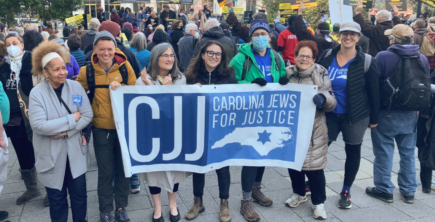
Our Community

Philanthropy

Read the stories and hear the voices of social change leaders fighting for justice.